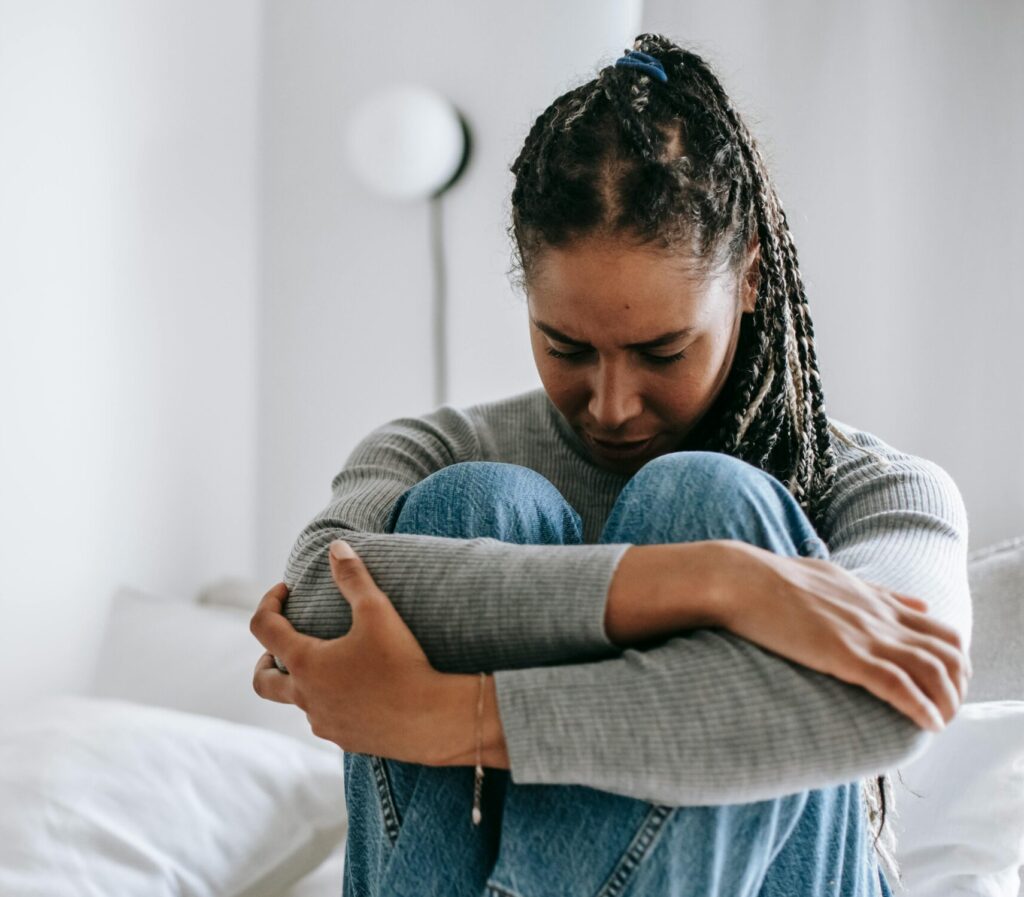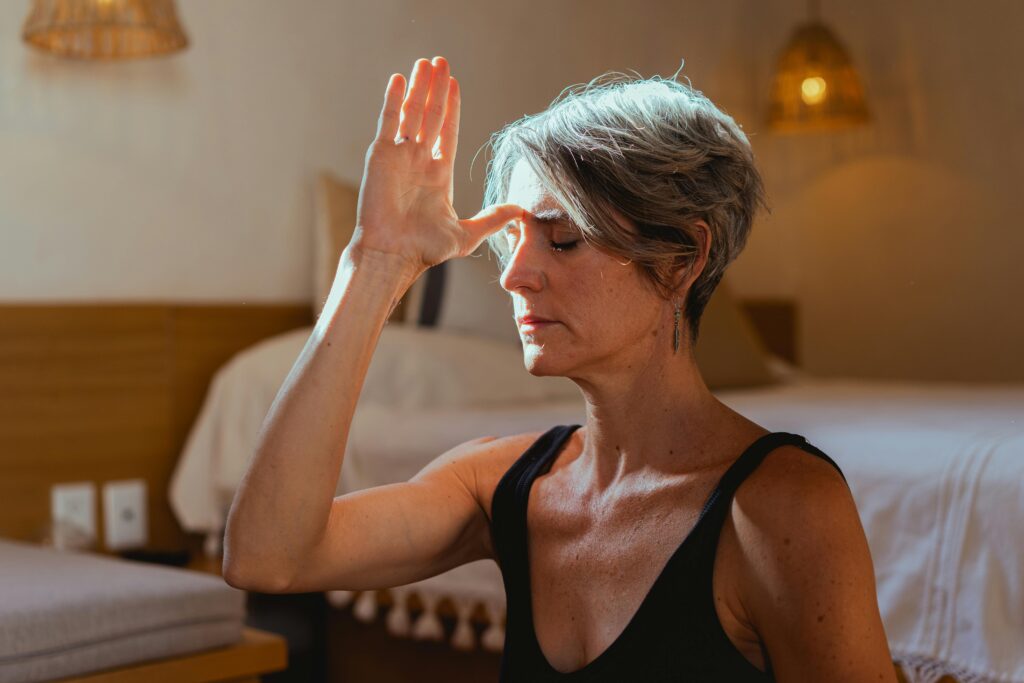Disclaimer: Not everyone who goes through menopause identifies as a woman and not all people who identify as women go through menopause. At Jayla, our core audience is people who identify as women, so we primarily use the word “women.” However, we’re working on specific content for people going through menopause who might not identify as women. Inclusivity is a key value of ours, so bear with us!
What we know about Black women and menopause
You might have been reading up on menopause and thought to yourself “This isn’t quite what I’m experiencing.”
Or perhaps you even went to your doctor, expressed your concerns about the night sweats you’ve been having, and they said “You can’t possibly be going through menopause yet.”
Or maybe you were told your forgetfulness would improve after four to six years, but here you are still experiencing brain fog, seven years later?
You’re not going crazy: most resources are tailored to the experiences of White women and most doctors rely on research from similar patient groups. Black women sometimes experience menopause differently, in terms of symptoms, timing, duration, and more. So if you feel that your experience is very different, that may simply be because the information is not tailored to you!
How does menopause affect Black women differently?
A lot more research about how Black women experience menopause still needs to be done for us to fully grasp the differences in experiences. However, we’ll share everything we know.
Menopause impacts every woman differently, so even if you don’t fully relate to the research on Black women, that’s okay. Every woman’s menopause experience is as unique as you are!
When do Black women start menopause?
On average, Black and Hispanic women reach menopause earlier than White, Chinese, and Japanese women. The average age of menopause, defined as the moment you’ve gone 12 consecutive months without your period, is 51 years old.
According to two studies in the 1960s and 1980s, Black women experience menopause six to 12 months earlier than their White counterparts, with a median age of 49.3 years in both studies (1). Studies in South Africa and Ghana also suggest that Black women enter menopause earlier (1).
A more recent study (2001) showed no difference when adjusting for other contributing factors. However, this might be because of greater self-censoring of Black women, particularly because of the higher incidence of surgical menopause among Black women and the sample group (1).
Surgical menopause is when a woman goes through menopause because of a surgery that removes her ovaries
The jury is still out, but we know that many Black women begin menopause at an earlier age than their White counterparts. That also means that perimenopause, which is a multi-year transition period before menopause with hormonal changes and accompanying symptoms, also starts earlier for Black women.
What are the symptoms of menopause like for Black women?
Length of symptoms
Black women typically endure menopausal symptoms for at least a decade, which is nearly double the duration experienced by women of other ethnicities (2). So if you’ve been dismissed by someone saying that your perimenopause or menopause symptoms couldn’t possibly last so long: you’re not imagining it!
On average, Black women experience menopausal symptoms for 10 years, while White women experience them for 6.5 years (2). That’s a significantly longer time to suffer if you’re not treating your symptoms.
Intensity of symptoms
Black women also tend to experience perimenopause and menopause symptoms more severely (3). Specifically:
- Hot flashes: Black women experience more frequent and more intense hot flashes (3), and endure these hot flashes for more years than women of other ethnicities (4).
- Vasomotor symptoms, which include hot flashes and night sweats: 10% more Black women experience vasomotor symptoms than White women in early menopause (5). Early menopause occurs when a woman goes through menopause before the age of 40.
What is the healthcare system like for menopausal Black women?
Our healthcare system is not the kindest towards menopausal women, let alone Black menopausal women. And we’re not just saying that: stats back it up too.
- Black women are prescribed hormone replacement therapy for menopause symptoms 26% less often than White women (6). Hormone replacement therapy is considered the most effective treatment for vasomotor symptoms (hot flashes and night sweats) and genitourinary symptoms (relating to our genital and urinary systems). Therefore, this suggests Black women have more difficulty getting relief for menopausal symptoms (7).
- Black women are less likely to receive treatment that includes vaginal estrogen (6).
There isn’t research on whether emotional symptoms of menopause vary among ethnic groups. However, it wouldn’t be a leap to believe that the emotional symptoms of Black women may be exacerbated by inequitable healthcare access and treatment. After all, Black women have long faced disparities in health outcomes because of racism and sexism (8).
High-profile Black women have spoken out about their menopause experience
Decades of inequality within the medical field have translated to suboptimal outcomes for Black women, so it is unsurprising that those outcomes also carry over to midlife. Recently, several prominent Black women have broken the silence and normalized discussions around menopause.
Can you guess who said these quotes?
- “it was like somebody put a furnace in my core and turned it on high and then everything started melting” (9)
Michelle Obama shared her experience of hot flashes in 2020, along with the relief she found through hormone therapy.

- “not to get too graphic but when it first happens for a lot of people, it looked like a crime scene” (10)
Gayle King, then a CBS News anchor, courageously addressed the topic on air, describing what happened when she suddenly had an irregular, heavier menstrual flow.

- “I never had a hot flash in my life. Never had one … but I started (menopause) at 48 with heart palpitations. And I went from doctor to doctor, literally five different doctors. At one point, a female doctor had given me, first of all, an angiogram and put me on heart medication and never once mentioned that this could be menopause or perimenopause.” (11)
Oprah Winfrey, even the most famous Black woman Billionaire, couldn’t get a proper diagnosis for her perimenopausal heart palpitations!

Black women experiencing menopause differently matters
It matters that Black women experience menopause differently. Menopause is already a tough time for any woman, but add earlier transition and longer symptoms, and it’s really tough. Not to mention potentially not receiving the treatment we need.
Black women experiencing menopause differently could lead to higher risks of certain conditions.
Potential health implications of Black women entering menopause earlier
Risk of heart disease
After menopause, women are more likely to develop health issues, such as heart disease. Research indicates that going through menopause prematurely may increase the likelihood of developing heart disease in the future (10). Accordingly, Black women may have a higher risk of heart disease after menopause due to its earlier than average onset. More research needs to be done in the area.
Issues connected to metabolic syndrome
Black women have a higher likelihood than White women of having metabolic syndrome. Metabolic syndrome is a group of conditions that raise the risk of developing health problems like heart disease, diabetes, or stroke. These conditions include high blood pressure and high levels of fats in the blood. Studies show that Black women may face a greater increase in metabolic syndrome severity during menopause, leading to more health issues in their older age (10).
Once again, more research needs to be done to determine the long-term impact of Black women’s menopause experience.
So what now?
That might have painted a pretty bleak picture. But there is some good news: more research is being conducted (although rather slowly), more people are talking about menopause, and more solutions are being made available for women of all colors.
In the meantime, Black women should be aware of the potential severity of perimenopausal symptoms and earlier onset of menopause. Find a provider who specializes in menopause care to make sure they know what they’re talking about.
But remember, not all clinicians are equally trained. Women, especially Black women, must often advocate for themselves to get the care they need. If you are not satisfied with your current provider, try to find a new one who is focused on your needs.
That being said, it is not for Black women alone to fix decades of structural racism (and sexism). Healthcare systems must play a bigger role in treating symptoms, researching racial and ethnic disparities, and training doctors accordingly.
Additionally, understanding how factors like discrimination affect midlife health is crucial for improving outcomes. This means healthcare providers need to pay more attention to the broader issues that Black women face during midlife.
Jayla’s commitment to Black women
At Jayla, we have a deep understanding of the unique challenges Black women face during menopause, as well as within our healthcare system more broadly. That’s why our approach is rooted in inclusivity, empathy, and a commitment to providing healthcare on your terms.
Jayla is led by a Black woman co-founder and is supported by an advisory and consulting team composed of 50% women of color. Our clinical team includes Black women and other women of color with deep menopause expertise. We want you to feel comfortable, knowing that your thoughts and experiences are heard, valued, and affirmed. Finally, we also partner and contract with firms led and staffed by women of color. We value equity and inclusivity, so we’ve purposefully built our company with those values embedded in every part of the organization.
References
- Gold, E.B. et al. (2001) Factors associated with age at Natural Menopause in a multiethnic sample of Midlife Women, OUP Academic. Available at: Source (Accessed: 21 June 2024).
- Paramsothy, P. et al. (2017) Duration of the menopausal transition is longer in women with young age at onset: The multiethnic study of Women’s health across the nation, Menopause (New York, N.Y.). Available at: Source (Accessed: 21 June 2024).
- Thurston, R.C. et al. (2008) Beyond frequency: Who is most bothered by vasomotor symptoms?, Menopause (New York, N.Y.). Available at: Source (Accessed: 21 June 2024).
- Nancy E. Avis, P. (2015) Duration of menopausal vasomotor symptoms, JAMA Internal Medicine. Available at: Source (Accessed: 21 June 2024).
- Harlow, S.D. et al. (2022) Disparities in reproductive aging and midlife health between black and white women: The Study of Women’s Health Across The Nation (Swan) – women’s midlife health, BioMed Central. Available at: Source (Accessed: 21 June 2024).
- Blanken, A. et al. (no date) Racial/ethnic disparities in the diagnosis and management… : Menopause, The Journal of The Menopause Society. Available at: journals.lww.com (Accessed: 21 June 2024).
- (2022) NAMS Hormone Therapy Position Statement. Available at: Source (Accessed: 26 June 2024).
- Peebles-Wilkins, W. et al. (2023) Racism, sexism, and the crisis of Black Women’s Health, Boston University. Available at: Source (Accessed: 26 June 2024).
- TodayShow (2020) ‘everything started melting’: Michelle Obama recounts Epic hot flash, talks aging, TODAY.com. Available at: Source (Accessed: 21 June 2024).
- Gayle King and Drew Barrymore share their experiences with menopause and the one word they would use to describe it (no date) CBS News. Available at: Source(Accessed: 21 June 2024).
- TodayShow (2023) Oprah says her 1st menopause symptom was missed by 5 doctors, TODAY.com. Available at: Source (Accessed: 21 June 2024).
- Zhu D;Chung HF;Pandeya N;Dobson AJ;Hardy R;Kuh D;Brunner EJ;Bruinsma F;Giles GG;Demakakos P;Lee JS;Mizunuma H;Hayashi K;Adami HO;Weiderpass E;Mishra GD; (no date) Premenopausal cardiovascular disease and age at Natural Menopause: A pooled analysis of over 170,000 women, European journal of epidemiology. Available at: Source (Accessed: 21 June 2024).



